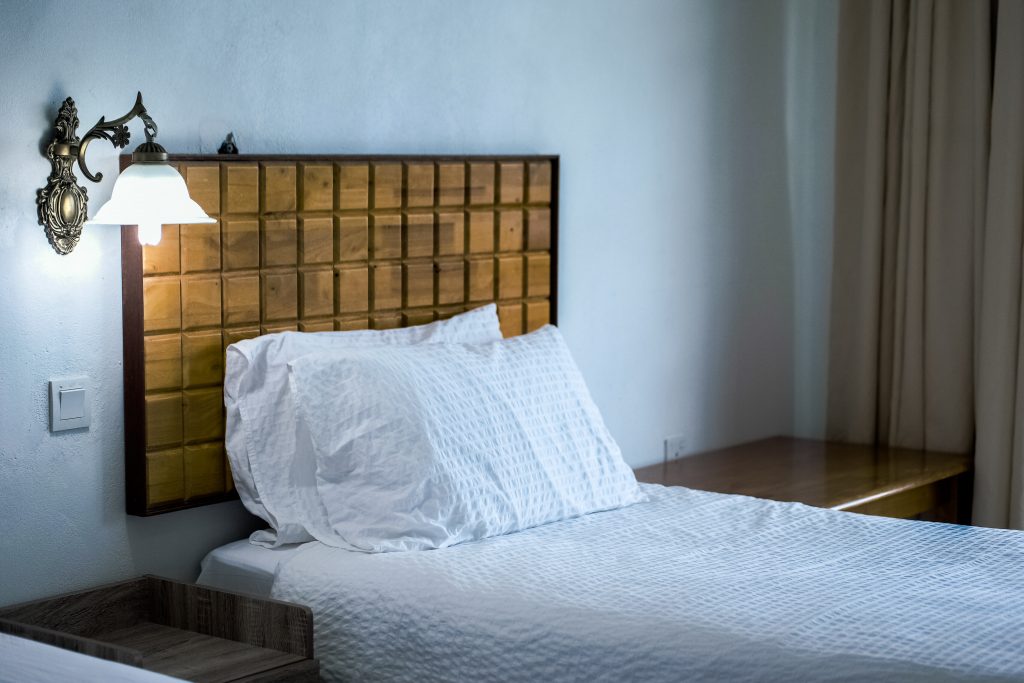
So, you need to buy a new mattress.
I know it can be quite difficult, because new brands spring up like mushrooms after the rain and you do not always understand what really lies behind the mattress descriptions on their websites.
As I have just got a new mattress recently, I want to share with you this simple four-step guide based on my experience.
Continue reading if you need advice on choosing your perfect mattress:
Step 1: Do Your Research
The most obvious point is to do your own research, so that you could come to the store fully armed.
But, where do we begin?
I suggest you familiarize yourself with the basic types of mattresses on the market and their main highlights:
- innerspring mattresses
These are a perfect choice for those who love a bouncy feel and a small amount of cushioning. The spring block inside this mattress offers optimal air circulation and helps you avoid sleeping hot.
Cons: Spring beds are quite heavy and often have terrible motion isolation. So, if your partner is an active sleeper, this can be not the best choice for you.
- foam mattresses
These are the most popular. Foam has an excellent ability to adapt to your sleeping body and support the neutral alignment of your spine.
Cons: Foam mattresses tend to sleep hot. And overheating during sleep can lead to insomnia.
- latex mattresses
Latex is a natural material, which means it is more breathable than foam mattresses. In addition, it is perfect for people prone to allergic reactions or someone with sensitive skin, because dust mites or mold simply cannot live inside the latex cells.
Cons: The cost of a latex mattress is often considerably higher than that of a similar foam or innerspring model.
These models took the best of all worlds by using steel coils, latex, polyfoam, memory foam, gel, etc. and combining these materials in different sequences. They can offer you the most balanced weight distribution, relax your pressure points, and allow you to sleep comfortably in any position.
Cons: Similarly to latex models, hybrids are usually quite expensive. Plus, combining different materials may result in an unusual feel, which may not appeal to everyone.
“Understanding the types of mattresses can boost your critical thinking, so you no longer will be fooled by sales pitches and marketing tricks.”
Step 2: Go Through Reviews

So, you have decided on the type of your mattress.
However, this is only the beginning.
To understand how the selected model fulfills its properties,r refer to the reviews of people who have already bought it and slept on it.
This can be done in several ways:
- search reviews on Amazon or another online marketplace
Typically, you can find there the most recent reviews and actual photos. But note that you may not always find the exact mattress you are looking for.
- listen to influencers and bloggers
Some manufacturers actively cooperate with media influencers and offer them to review their products to a wide audience. Sometimes, though, these reviews may be biased, so choose wisely.
- look for experts who test mattresses and review them professionally
If you are lucky to find a reliable review resource, you will not have to look any further. The teams behind such web resources test mattresses independently, taking into account their ergonomics and compliance with the stated standards, and then put what they have found into detailed reviews.
You can study these Happysleepyhead’s most recommended mattresses[1] as a starting point. There is a wide variety of models for every sleeper.
Step 3: Define the Level of Support You Need
What makes a mattress comfortable?
The balance between support and cradling. Mattresses that are too firm, as well as those that make you feel like you’re drowning in your bed, are equally uncomfortable for most people.
So, what should you look for in order to not miss that balance?
Sleeping position
Each sleeping position requires a different level of firmness:
- back sleepers need uniform sinkage, as their spine is naturally aligned;
- side sleepers should seek the ability of a mattress to gently cradle their shoulders and hips, so the sinkage should be deeper;
- stomach sleepers require less sinkage to support for their lower back.
“If you have any health problems, such as pain in your lower back or neck, then it is best to choose a mattress based on these issues.”
Firmness and Weight
Firmness is tightly connected to your body weight.
Why?
Because it actually is your subjective perception. Obviously, you will perceive a bed as a firmer one if you do not sink into it deeply enough because of your smaller weight.
“Firmness scales of different manufacturers may differ among themselves, which is another reason you should check out user reviews.”
Here are some tips on how to choose the most comfortable firmness level for your needs:
- for lightweight sleepers, softer models (3-5 out of 10) are best because they will offer just the right amount of sinkage for their pressure points;
- medium-firm options (5-7 out of 10) are suitable for sleepers with the weight between 130 and 230 pounds;
- plus size sleepers should opt for firmer mattresses (7-9 out of 10), as they will sink in deeper due to a larger weight.
“If you sleep with a partner, be sure to test the mattress together. This way, you will know whether it is suitable for the load that both of you will put on it.”
Step 4: Check the Trial and Return Policy
Now, you should understand that knowing all the best tips on choosing a mattress is not a 100% guarantee of your finding the right match. There is still a chance that you may not feel comfortable on the chosen mattress.
So, the question is, what will you do if this happens?
And the answer is, use the return policy!
Today, most brands focus on ensuring you will have an enjoyable shopping experience in the following ways:
- they offer long trial periods: 90, 100, and even 365 nights;
- they have hassle-free returns, meaning if you find out that your mattress is not perfect during the trial, you can return it and get a full refund;
- they may also offer you to simply replace the model you didn’t like with a different one that may match your needs better.
Note that some of these actions may require additional expenses on your side. So, do not hesitate to clear this up before you make a purchase.







